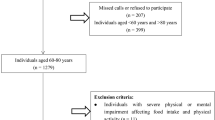Abstract
Purpose
While stroke is already considered a nutrition-related disease, the prevalence of the broad array of disordered eating behaviors is under-reported in this disease. We describe the case of a stroke in a young woman following a recent food addiction to fatty-sweet food.
Methods
She was diagnosed with a Night-Eating-Syndrome, with a loss-of-control exclusively towards sugary carbohydrates used to manage her insomnia and distress, and her consummatory behaviors were investigated.
Results
This case report illustrates a self-medication of a significant psychological distress by shifting from a healthy diet to an overconsumption of hyper-palatable foods, triggering an addiction disorder. The related hypertriglyceridemia, on top of chronic smoking, contributed to the development of an atherosclerotic plaque and thrombus formation.
Conclusion
Food addiction might be considered as an emerging stroke risk factor. We suggest it fosters the need to take into consideration addictive-like eating behaviors and associated mental disorders in the primary and secondary prevention of stroke. This may be particularly relevant for the prevention of stroke in women as they are more prone to comfort their emotions with food.
Level of evidence
V, descriptive study.


Similar content being viewed by others
Notes
We searched PubMed from MEDLINE for original articles for the following indication terms: (eating disorders OR food addiction OR emotional eating OR stress-induced eating OR food craving) AND (stroke OR cerebral stroke). Thirty-three papers came out but were related to post-stroke eating disturbances (feeding and swallowing) and/or nutritional support.
References
Davis C (2013) From passive overeating to “food addiction”: a spectrum of compulsion and severity. ISRN Obes 2013:1–20. https://doi.org/10.1155/2013/435027
Sinha R, Jastreboff AM (2013) Stress as a common risk factor for obesity and addiction. Biol Psychiatry 73:827–835. https://doi.org/10.1016/j.biopsych.2013.01.032
Volkow ND, Koob GF, McLellan AT (2016) Neurobiologic advances from the brain disease model of addiction. N Engl J Med 374:363–371. https://doi.org/10.1056/NEJMra1511480
Paterson C, Lacroix E, von Ranson KM (2019) Conceptualizing addictive-like eating: a qualitative analysis. Appetite 141:104326. https://doi.org/10.1016/j.appet.2019.104326
Hebebrand J, Albayrak Ö, Adan R et al (2014) “Eating addiction”, rather than “food addiction”, better captures addictive-like eating behavior. Neurosci Biobehav Rev 47:295–306. https://doi.org/10.1016/j.neubiorev.2014.08.016
Spence J (2019) Nutrition and risk of stroke. Nutrients 11:647. https://doi.org/10.3390/nu11030647
Johnson CO, Nguyen M, Roth GA et al (2019) Global, regional, and national burden of stroke, 1990–2016: a systematic analysis for the Global Burden of Disease Study 2016. Lancet Neurol 18:439–458. https://doi.org/10.1016/S1474-4422(19)30034-1
O’Donnell MJ, Chin SL, Rangarajan S et al (2016) Global and regional effects of potentially modifiable risk factors associated with acute stroke in 32 countries (INTERSTROKE): a case-control study. Lancet 388:761–775. https://doi.org/10.1016/S0140-6736(16)30506-2
Hankey GJ (2017) Stroke. Lancet 389:641–654. https://doi.org/10.1016/S0140-6736(16)30962-X
Salvagno GL, Favaloro EJ, Demonte D et al (2019) Influence of hypertriglyceridemia, hyperbilirubinemia and hemolysis on thrombin generation in human plasma. Clin Chem Lab Med (CCLM) 57:1784–1789. https://doi.org/10.1515/cclm-2019-0135
Camilleri GM, Méjean C, Bellisle F et al (2016) Intuitive eating is inversely associated with body weight status in the general population-based NutriNet-Santé study: Intuitive Eating and Weight Status. Obesity 24:1154–1161. https://doi.org/10.1002/oby.21440
Funding
Yolaine Rabat is a Ph.D. fellow funded by the French Ministry of Research and Higher Education. This funder had no role in collection, analysis, interpretation of the data, writing the manuscript or the decision to submit it for publication.
Author information
Authors and Affiliations
Corresponding author
Ethics declarations
Conflict of interest
All three authors disclose any actual or potential conflict of interest.
Research involving human participant
All procedures performed in this case study involving a human participant were in accordance with the ethical standards of the institutional and/or national research committee and with the 1964 Helsinki Declaration and its later amendments or comparable ethical standards.
Informed consent and patient details
The patient provided her written informed consent and no personal details are included in any parts of the manuscript.
Additional information
Publisher's Note
Springer Nature remains neutral with regard to jurisdictional claims in published maps and institutional affiliations.
Supplementary Information
Below is the link to the electronic supplementary material.
Rights and permissions
About this article
Cite this article
Rabat, Y., Berthoz, S. & Sibon, I. Is addictive-like eating an overlooked stroke risk factor? A study case. Eat Weight Disord 26, 2801–2806 (2021). https://doi.org/10.1007/s40519-021-01115-6
Received:
Accepted:
Published:
Issue Date:
DOI: https://doi.org/10.1007/s40519-021-01115-6




